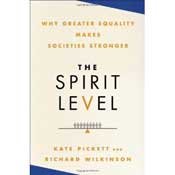Wednesday, October 20, 2010
I've heard it all my life: America is the best country in the world. Within that framework, it's nearly impossible to understand why conditions for many Americans are so bad. Why, for example, in a nation that gives billions of dollars in foreign aid to those we consider less fortunate, are millions of American children living with "food uncertainty," that oh-so-mild euphemism for "they don't know where their next meal is coming from"? Why, in a country that has the most advanced medical care are our life expectancies on par with South Korea and Cuba, countries we consider, in generous moments, "backward"?
Brits Richard Wilkinson and Kate Pickett put forth a credible theory answering those questions in their book "The Spirit Level: Why Greater Equality Makes Societies Stronger" (Bloomsbury Press, 2010, $28). The U.S. version of the book—first published in Great Britain in 2009—includes a forward by former U.S. Secretary of Labor Robert B. Reich.
"'The Spirit Level' looks at the negative social effects of wide inequality—among them, more physical and mental illness not only among those at the lower ranks but even those at the top of the scale," Reich writes. "The authors ... argue convincingly that wide inequality is bad for a society, and that more equal societies tend to do better on many measures of social health and wealth."
You have to be living under a rock not to know that levels of crime and violence, obesity and imprisonment in the United States are higher than most other industrialized nations. In those statistics, the U.S. looks more like a developing country than the most advanced nation in the world. And Americans are losing an age-old struggle: The rich get richer, while the poor get poorer.
It is this trend toward ever-greater inequality that may explain the slide we've experienced on "many measures of social health and wealth" in the U.S. The surprising findings of Wilkinson and Pickett, however, demonstrate that the wealthy are not insulated from that slide. As Reich points out, "even those at the top of the scale" in America are affected by drug addiction and violence, poor mental and physical health, shorter life spans, poor educations and an inherently unjust system of imprisonment and punishment.
This painstakingly researched book, which includes data on 23 of the richest countries in the world (including many European countries, Japan, Australia and the United States) and all 50 American states, outlines evidence that we are close to the limit (maybe we've exceeded it) of what sustained economic growth can do for our society. We are, in fact, rich enough. And more money and possessions aren't going to improve the social markers of our health, happiness or wellbeing.
"Economic growth, for so long the great engine of progress, has, in the rich countries, largely finished its work," the authors write. And while economic growth counts for a great deal as countries pull themselves up from abject poverty, "... as nations join the ranks of affluent developed countries, further rises in income count for less and less."
It's predictable, the authors state, because more isn't necessarily better: "If you're hungry, a loaf of bread is everything, but when your hunger is satisfied, many more loaves don't particularly help you," they write.
"The Spirit Level" looks at nine areas of modern societal problems, plotting them against the lens of inequality. In example after example, countries (and U.S. states) with higher levels of inequality show higher propensities for trouble. Proportionately, for example, more people suffer from mental illness in countries with high levels of inequality. Why? Look no further than our emphasis on commercialization: We place high values on "acquiring money and possessions, looking good ... and wanting to be famous," which, in turn, put us at "greater risk of depression, anxiety, substance abuse and personality disorder," regardless if we get those things or not. The tentacles of "afluenza" and the "status anxiety" of the wealthy reach throughout our society.
Without exceptions, societal ills are worse in countries and states with greater inequality. Whether the focus is community life and social relations, mental and physical health, obesity, education performance, teenage births, violence, prisons or social mobility, the U.S. leads the developed, "rich" world with its poor performance in these wellbeing markers. The statistical relationships are simply "too strong to be attributable to chance."
Wilkinson and Pickett pull no punches. We live shorter, more brutish and less healthy lives. We have more teen mothers, more people in prison and a more poorly educated population than countries who don't have CEOs making 900 times more than their workers (as was the case for Walmart in 2005).
If the book has a failing, it is in its tepid presentation of how to resolve the massive inequalities we inherited at the beginning of this century. The authors point toward co-operatives and employee-ownership of companies, for example, and to the political will that must enforce a movement toward more corporate regulation, a more progressive tax system (where citizens pay taxes, proportionately) and to sustainable technologies.
"We need to find news ways," the authors write. Perhaps commitment is enough to bring about this "biggest transformation in human history."
Big, but simple: All people do better when they are more equal. The question is: Can we make it happen?

Comments
Use the comment form below to begin a discussion about this content.
Sign in to comment
Or login with:
OpenID